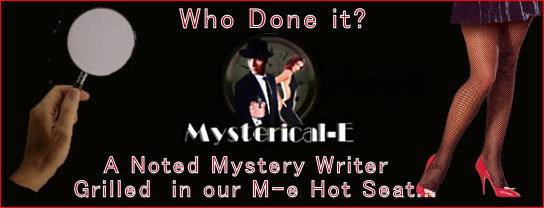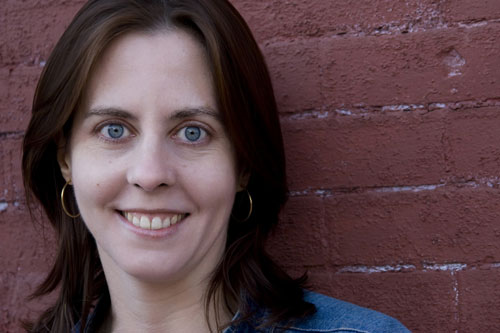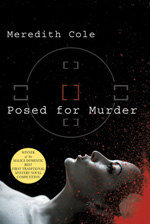 |
An Interview With Meredith Cole by Montiese McKenzie
Meredith Cole directed feature films and wrote screenplays before writing mysteries. She won the St. Martin 's Press/Malice Domestic Best First Traditional Mystery competition in 2007. Her book, POSED FOR MURDER, was published by St. Martin's Minotaur in February 2009, and is about a photographer named Lydia McKenzie who does murder recreation pictures. When she has a show in a gallery, she is horrified to discover that someone is killing her models just like her photographs. Lydia McKenzie also appears in the short story “Exercise is Murder” in the June 2008 Ellery Queen Mystery Magazine, and in the story “Out in the Cold” in the anthology MURDER NEW YORK STYLE. She is a member of the MWA NY board, and she blogs at www.thedebutanteball.com.
MM: What is your approach to writing a novel: that is, do you outline or not? Do you keep files and piles of notes? MC: I do outline, but in only the most perfunctory way. I write a few sentences for each of the scenes in the book, and then divvy them into chapters. Before I start writing, I need to have some sense of where I'm going and what will happen next. When I start to write the book, I paste the outline into my document and it becomes the bare bones of the book. But I also continue to expand and work on the outline as I write the novel. I don't let the outline tie me down, but I find it a useful skeleton.
MM: What are some of the tricks, pitfalls, etc. that you need to keep in mind when writing a mystery novel/story? MC: Writing a mystery is challenging. Even the common assumptions that someone has to die and that someone else has to have killed them are not necessarily the case in every story. But there has to be central crime surrounded my questions, or your story will be over in one sentence. I recommend bringing in several likely suspects with lots of secrets to keep things interesting and keep your reader guessing. The best mysteries are ones that have a great sense of place, just like any other novel. So beyond the genre, make sure you're telling a good story with believable characters that doesn't insult anyone's intelligence with unlikely events.
MM: What is it that kick starts a project for you: a character, a situation, or…? MC: A situation usually sparks my stories, and I begin to wonder “what if…” Sometimes it's a scene or an image (I started off as a filmmaker, after all), and I've even had particularly vivid dreams that have inspired stories. Then as the story develops, all these lovely characters appear and begin to take over the book.
MM: What started you in writing? (Was it always a dream of yours?) MC: I began to write before I could even read. I would dictate stories and songs to my mother, and she would write them down for me. I wrote one particularly memorable song about Alexander the Great, which I can still sing. I was a filmmaker for years (which I see as just another form of storytelling), and a screenwriter. But when I began to write a mystery novel, I realized that writing a book made me happiest. I love to read, so holding my first book was quite a thrill.
MM: What keeps you writing? What inspires you? MC: When I write, I can't wait to find out what is going to happen next. I also love the satisfaction of finishing a story. There's nothing more exciting then realizing you've gotten all the way through the book and it is good.
MM: Can you tell us a bit about the first story you had published -- how did that come about? And how do you feel about it now, i.e. would you like to change it and how? MC: The first mystery story I published, “Out in the Cold,” was in the anthology MURDER NEW YORK STYLE. The main character was my series character, and it was a great way to introduce her to readers. I enjoyed the short story process, but I don't think I quite figured out how to pace a short story until my second one, “Exercise is Murder,” published in Ellery Queen in June 2008.
MC: I have definitely grown as a writer in the past few years. My first drafts are not quite as messy, and I'm more satisfied with the finished book. The process of working with a writing group and then an editor has helped me quite a bit. On my first project, I had a hard time hitting the ground running. Now with three manuscripts and two short stories under my belt, I think I've become much better at starting off my stories with a bang.
MM: What are the three most important pieces of advice you'd give to beginning writers? MC: Write every day—keeping a journal can be very helpful. Read a lot. And don't give up.
MM: How long does it generally take you to complete a novel – from conception to completion? MC: It takes me about a year and a half. I keep hoping I'll get faster.
MM: How many revisions do you normally go through when writing a novel? MC: That's hard to estimate—probably around five. In the early drafts, I'm never afraid to toss out big chunks, write horrible dialogue, or just sketch in some of the details. I think it's important to keep going on first drafts and revise later. If you don't, you could end up rewriting chapter one for the rest of your life.
MM: Who are the authors who you admire most, who inspire you, whose writing you think is most beautiful, moving, exciting? MC: There are a lot of wonderful writers out there, and I return to some of their books again and again. I probably read “Pride and Prejudice” (Jane Austen), “The Greengage Summer” (Rumer Godden), “Gaudy Night” (Dorothy Sayers), and several Agatha Christie books about once a year. Some newer writers that I've discovered over the past couple of years include Will Thomas, Julia Spencer-Fleming, Laurie King, Donna Andrews, Donna Leon and John Burdett.
MM: What do you find most satisfying in a book: a great plot, beautiful writing, fully realized characters? MC: I love a wonderful plot twist that you never saw coming. It is like watching a particularly difficult move by a circus performer. But in the end, the characters are what stick with me after I finish a book.
MM: In your own work, what do you think you are strongest at: plot, beautiful prose, character? Or something else? MC: I think I'm strongest on plot, but I think my characters are interesting, too. And I continue to work and stretch to create beautiful prose. Since I come from a screenwriting backyard, I'm often too brief in my descriptions and need to go back to expand and fill in the whole picture for the reader.
MM: If you have a series: When doing a series, how "into" the world of that series do you get? Do you constantly think about that world and compare it to reality, changing it or fixing it as you go along? MC: I live in the same neighborhood as my series—so I end up thinking about my setting for my books quite a bit. Despite living in the big bad big city, there were probably only 6 murders in my neighborhood last year—so it's not exactly a hotbed of violence. But we do have drug dealers, prostitutes, gangs and gambling—all good fodder for a story. I'm a big fan of the police blotter, and it's sometimes hard to decide what to put in and what to leave out. Except for the violence in my books, I think I romanticize Williamsburg Brooklyn a lot. I leave out a lot of the changes of the past few years—artists forced to vacate because of rising rents, galleries leaving, condos being built—and put my stories in a place of my own imagining, about five years ago.
MM: What scares you about doing a series? MC: The idea of writing twenty books with the same characters and never writing anything else scares me. I'm afraid I'd end up hating my characters, and that would be a shame. I'm also afraid of the soap opera phenomena—you run out of ideas so everyone starts levitating or getting kidnapped by aliens. Or the whole thing becomes boring and stale and each book is exactly like the last.
MM: What are the advantages/disadvantages of series characters? MC: There's no need to figure out who all the characters are, you can just hit the ground running. That's a tremendous advantage. The disadvantage is that you have to keep torturing the same person again and again, and make their brushes with death not feel ridiculous.
MM: If you do not have a series (in publication or planning) would you like to? If so, why? If not, why not? MC: POSED FOR MURDER is the first book in a series. I love to read series, so I wanted to write one, too. If I really like certain characters, I hate to say goodbye to them when the book is over.
MM: What other kinds of writing do you do? MC: I blog weekly at www.thedebutanteball.com , have written a few non-fiction articles, write short stories, and I still write the occasional screenplay.
MM: What about readers – how have they received your books – do you hear from them, have any problems arisen, or any good/funny/touching experiences happened with regard to readers? What kind of fan mail do you get? Have you developed any friendships with fans over the years? What do your fans most like about your books? MC: My first book just came out a couple of weeks ago, so I don't have a lot of stories to tell yet. But I was really touched when a friend and neighbor told me that she's going to give my book to her daughter when her daughter is grown up. She said it would show her daughter what our neighborhood was like when she was little. I felt like I had really managed to capture the place and time I live in. MM: What are your goals as a writer? MC: My goal is to improve my craft with each book and each piece of writing. I would like to try to write a stand-alone, and perhaps even a young adult novel. I want to make sure that I'm always trying new things and not getting stagnant.
MM: Why do you think mystery is so popular? MC: There are unfortunately too many people getting away with murder in this world. Listening to the news about war-torn countries is heartbreaking. The mystery novel provides an alternate universe where bad guys pay the price for their crimes. I think readers also enjoy seeing if they can figure out the murderer before the sleuth.
MM: Why has mystery spawned so many sub-genres? MC: Mystery readers enjoy different kinds of stories. Some people like more or less violence (so they're attracted to cozies or thrillers), and more or less sex in their books (so they like romantic suspense or traditional mysteries). I love that it offers something for almost everyone.
MM: Talk about your most recent book and what it means to you. MC: I thought my neighborhood was interesting, and would be a great place to set a mystery. I love that Williamsburg Brooklyn is filled with hip young artists, but there are also various ethnic groups rubbing up against each other (Hasidic, Puerto Rican, Polish, and Italian). The first book I wrote with the series characters ended up being mostly biography and back story, and it ended up on the cutting room floor. In POSED FOR MURDER, where Lydia 's photographs become the blueprints for a killer, the violence was much closer to her, and made a more compelling story.
MM: Did you feel compelled to write this book? About this subject? MC: I was interested in writing a book where the sleuth is a photographer. I thought someone who looked at the world through a lens would be both a good observer, and someone who could be trying to distance herself from the emotions of death. I also wanted to see if I could have important clues come through the photographs.
MM: How long did it take to complete it? What was your least favorite part in the writing of the book? MC: The book took about a year to write. I entered it in the St. Martin 's/Malice Domestic Best Traditional First Mystery Competition, and found out six months later that I had won. And then I was given the opportunity to rewrite and polish my story under the guidance of my editor at St. Martin 's Minotaur. I dislike the process of extreme polishing (looking for multiple instances where you use the same word, etc.,), so I have to take lots of breaks.
MM: What do you like best about it? Which are your favorite characters and why? Which are your favorite moments in the story? MC: I love the moments when the story seems to be flying along and my characters seem to need me only to transcribe their conversations. I've had a few characters that have waltzed in and informed me that their character bio is completely wrong, and that they're really Jamaican or a transvestite or something. Writing great characters with strong voices is really satisfying, and I enjoy the surprises. |
|
|
Past issues and stories
pre 2005.
Subscribe to our mailing
list for announcements.
Submit your work.
Advertise with us.
Contact us.
Forums, blogs, fan clubs,
and more.
About Mysterical-E.
Listen online or download
to go.
|
|
|
 |
 |



